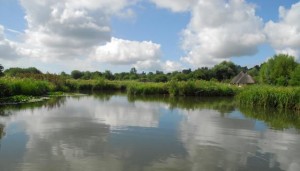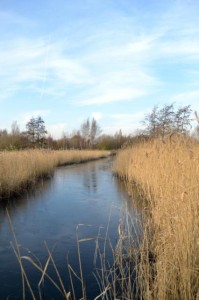Government scores poorly on tackling drought risk
 The risk of flooding and water shortage in 2013 has increased because the Government is too slow in changing the way we manage our water, environmental leaders warn.
The risk of flooding and water shortage in 2013 has increased because the Government is too slow in changing the way we manage our water, environmental leaders warn.
The authors of the ‘Blueprint for Water’ report say that after two dry winters, it took Britain’s wettest ever summer to narrowly avert a serious drought. They warn that despite this summer’s flooding, another series of dry winters would put Britain right back under serious risk of drought.
The group of 16 leading environmental organisations has published a scorecard which measures the Government’s performance against the 10 steps to sustainable water by 2015.
The scorecard commends the Government’s commitment to tackle unsustainable abstraction of water from rivers and wetlands, extend the use of metering at a fair price and to develop a catchment based approach to managing the water environment.
But a lack of actual progress on the ground or in legislation in many areas means the Government fails to score higher than a ‘C’ grade for any area of work (see full scorecard below).
The organisations says a long-term, sustainable approach is needed, one which works with our natural water systems. For example, we need to use moors, marshes and plants to store and clean rain water, instead of allowing it to run straight into rivers and thus increase the risk of flooding.
Chair of the Blueprint for Water coalition, Carrie Hume said:
“Lack of action to fix our broken water system is a false economy. We cannot continue to lurch between flooding and drought which is damaging for people, businesses and wildlife.
 “The Government rightly recognises it’s our own over-use of water and interference with natural water flows which has put us in this mess, but it needs to back its words with action.
“The Government rightly recognises it’s our own over-use of water and interference with natural water flows which has put us in this mess, but it needs to back its words with action.
“We need to use natural filters like marshes, reeds and moors to regulate water flow and stop flooding. We also need to regulate our own water use through universal metering at a fair price and by reducing pollution and over-abstraction of water by industry and farming.
“In the context of climate change and population growth the challenges are enormous, and Government is best-placed to drive the changes which we all need to make. It needs to start acting quickly if we are to give our most precious natural resource a sustainable future.”
The 2010 Blueprint for Water was launched in November 2010 and to monitor progress the Government is scored every two years on its progress. The 2012 progress report summary is below.
Blueprint for Water Scorecard summary on the Government’s progress towards the 10 steps for sustainable water by 2015
1. Waste less water: Progress has been patchy – C
• A lack of progress overall, despite ambition in the Water White Paper, Water for Life and elsewhere.
• Excellent progress on standards at an EU level for public sector procurement.
2. Keep our rivers flowing and wetlands wet: Progress has been patchy – C
• The proposals set out in Water for Life are very welcome and we support Defra’s work on long term reforms.
• This should be complemented by inclusion of a timetable in the 2013 Water Bill.
• Alarmingly little progress on addressing current over-abstraction, with no clarity on how the Water for Life proposals will be implemented.
3. Price water fairly: Must try harder – D
• Critical lack of support for universal metering in Water for Life.
• Some recent progress on definitions of water stress.
• Only a few areas will achieve universal metering by 2015.
4. Make polluters pay: Must try harder – D
• The Catchment Restoration Fund has been established, but is not making polluters pay.
• Progress on the ambition for abstraction reform, but not sufficient to meet this target.
• Lack of progress on fines and enforcement, and cross-compliance.
5. Stop pollutants contaminating our water: Urgent action needed – E
• Poor progress on reducing levels of pollutants, with voluntary action not yet shown to work at the scale required.
• Poor progress on reducing pollution of water bodies from endocrine-disrupting chemicals and pesticides, which must be adequately dealt with in the water environment.
6. Keep sewage out of homes and rivers and off beaches: Must try harder – D
• Continued, disappointing delay in the enactment of regulations for implementing Sustainable Drainage Systems (SuDS).
• Little progress on colour coding to reduce misconnections. Insufficient commitment to real time monitoring and reporting of all Combined Sewer Overflows.
7. Support water-friendly farming: Progress has been patchy – C
• Agri-environment targeting has improved, but there is still scope for better delivery of environmental outcomes.
• Excellent progress on using modulation of CAP funds to protect wildlife and prevent pollution. Defra must ensure joined-up thinking on farming and sustainable land management in its CAP negotiations.
8. Clean up drainage from roads and buildings: Must try harder – D
• Lack of progress on both National Standards and retrofitting for SuDS.
• No roadmap for further action on SuDS.
• No clear narrative around the wider environmental and social benefits of SuDS. Patchy progress by Local Authorities.
9. Protect and restore catchments from source to sea: Progress has been patchy – C
• Good progress on the catchment-based approach and Nature Improvement Areas, which must contribute to a coherent ecological network.
• Poor progress on assessing the cumulative effects of river engineering.
10. Retain water on floodplains and wetlands: Must try harder - D
• Progress on capital spending for flood risk management.
• Controls preventing floodplain development less certain, despite a coalition commitment to prevent unnecessary development.
• No progress on protecting vital peat soils, or on supporting climate adaptation along river corridors.
The Blueprint for Water coalition is a unique group of environmental, water efficiency, fishing and angling organisations which call on the Government and its agencies to set out the necessary steps to achieve “sustainable water” by 2015.
The Blueprint for Water is a campaign of Wildlife and Countryside Link. The 16 Blueprint for Water coalition members are: Amphibian and Reptile Conservation; Angling Trust; Buglife; Freshwater Biological Association; Friends of the Earth; Marine Conservation Society; National Trust; Pond Conservation; The Rivers Trust; RSPB; Salmon & Trout Association; Wildfowl & Wetlands Trust; Waterwise; The Wildlife Trusts; Woodland Trust; and WWF.

